
Whipped COCOA Butter Body Cream
- Out Of Stock

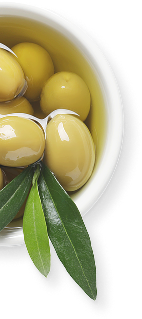
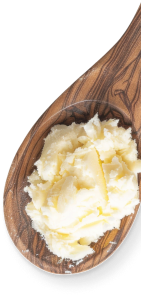
If you love chocolate, this decadent face and body bar is a treat. Swirled with real chocolate and enriched with cocoa butter, coconut milk, and honey, it creates a rich, creamy lather with a warm cocoa aroma that leaves skin feeling soft, calm, and deeply moisturized.





Good For: Normal to Dry Skin • Mature Skin • Sensitive Skin
Chocolate & Honey is a soap made for those who enjoy a richer kind of clean. Swirled with real chocolate and cocoa powder, this bar feels as luxurious as it looks. It creates a dense, creamy lather that feels rich in the hands and leaves skin comfortably moisturized and soft.
As you lather, a natural cocoa aroma gently unfolds — warm, comforting, and unmistakably real. It turns an everyday routine into a small moment of pleasure.
This is a soap for chocolate lovers, yes — but also for anyone who appreciates a beautiful, natural soap that feels nourishing and gentle on the skin.
Every ingredient in this soap is chosen for a reason. Thoughtfully combined, they work together to create something richer than a simple cleanse — a carefully crafted bar that goes beyond ordinary soap.
Highlights of this recipe:
👉 Learn more about our Aroma, Texture & Lather notes
Real chocolate. Rich lather. A bar that feels unmistakably special.
We believe in simple, effective cleansing for your complexion and that is accomplished with natural soap and water. The purpose of soap is to combine with oil and dirt on the body, which allows water to wash it away. The method you use to cleanse your skin, especially your face, is really personal preference. We thought we would share just a few examples. 
Hand Lathering is usually the suggested method for cleansing delicate facial skin.
Washcloth Washers: A washcloth can help remove dead cells and invigorate your skin. A gentle massage with a soft washcloth can help keep facial skin smooth and clean.

If you are using a washcloth:
Never share washcloths or other accessories and replace or clean them often.
A Few Other Pointers:

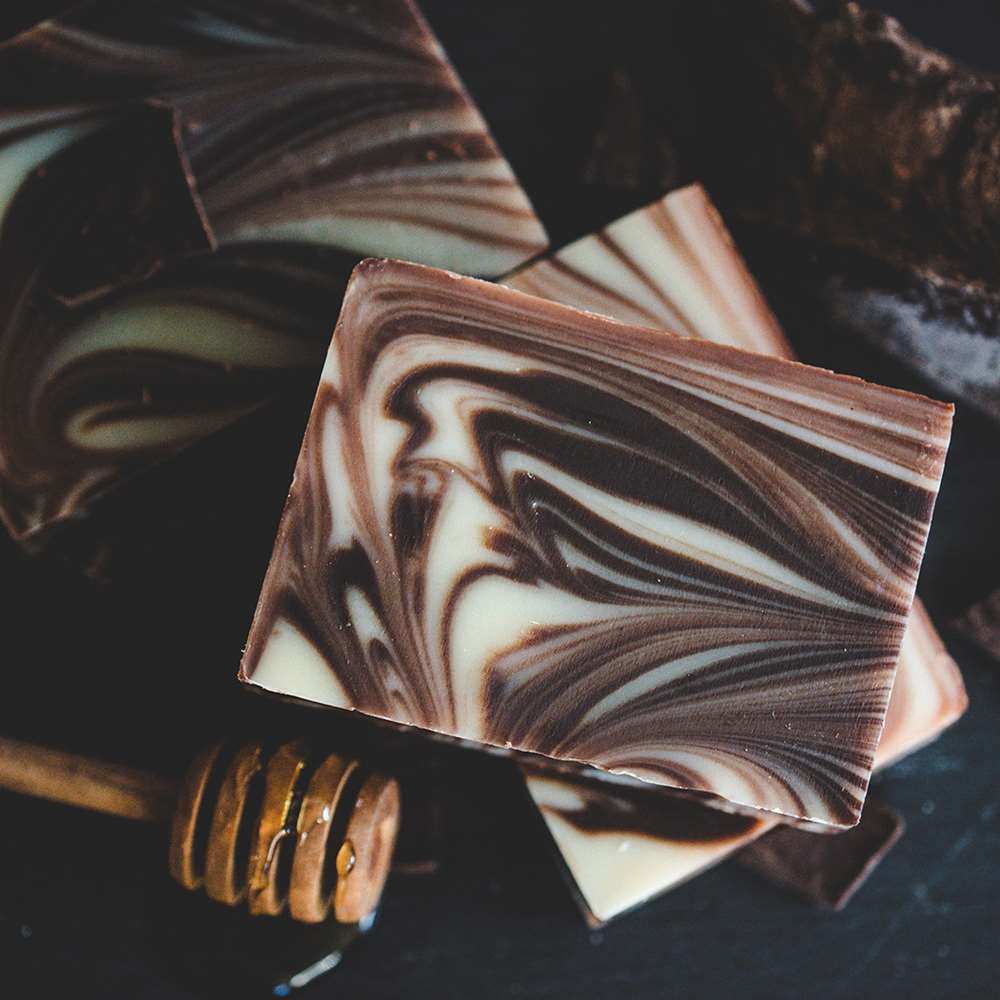
The goal is simple: to Harness the Power & Simplicity of Nature® to cleanse, soothe, heal, and protect your skin and hair!
Our unique formulas rely on moisturizing oils and butters, healing botanicals, and pure essential oils. We choose every ingredient with one end-result in mind….the BEST possible natural skin care for YOU!
 Organic Chocolate*
Organic Chocolate*
 Organic Cocoa Butter*
Organic Cocoa Butter*
 Organic Honey
Organic Honey
|
*Ingredient is Fair Trade Certified ^Used in the saponification process to turn oil into soap and glycerin. None remains in the finished product.
Made with certified organic Oils, Cocoa Butter & Chocolate
|
I have been using only natural soap on my face and body for over 20 years. It is the first product I learned to make.

My skin has become so accustomed to the benefits of these lovely bars, that everything else makes my skin itch.
Our soap bars travel with me everywhere I go. I even keep one-time-use scraps in my purse to use in public restrooms!
While I believe that many of the "reasons" listed below may apply to some natural handmade soap companies, I will focus on the one company with which I have intimate knowledge and experience--CHAGRIN VALLEY.
Most of the soap you purchase today is a commercially manufactured chemical cocktail of ingredients. It is not natural and is not even really “soap.” They are nothing more than detergents in disguise.
Here is what the FDA has to say:
“Today there are very few true soaps on the market. Most body cleansers, both liquid and solid, are actually synthetic detergent products. Detergent cleansers are popular because they make suds easily in water and don't form gummy deposits. Some of these detergent products are actually marketed as "soap" but are not true soap according to the regulatory definition of the word.” Source
The very best reason to use natural soap is the ingredients. A product is only as good as the ingredients used to make it.
OUR skin-nourishing ingredients are USDA Certified Organic, sustainably produced, cruelty-free, and ethically traded.
Harnessing the Power of Nature we make each soap bar unique by adding a variety of organic butters, purifying natural clays, organic herbs, seeds, grains, spices, flowers, vegetables, fruits, chocolate, and pure botanical essential oils to provide natural color, aromatherapy, texture, and gentle exfoliation.
Our soap bars contain only the ingredients that they need—no extra preservatives that liquid body washes or commercial bar "soaps" require to increase their shelf life to years, and no foam boosters to make them lather.

Sadly many people have the misguided perception that all bar soaps will dry your skin. The problem is that most commercial bar “soaps” are detergents and not real soap.
So why are natural soaps so moisturizing? Of course, it's the ingredients! Natural soap made of pure ingredients derived directly from nature is a rare find these days. Here are a few other reasons.
Superfatting
Superfatting is the process of adding extra fats (oils or butters) when formulating a soap recipe so there is more fat in the mixture than the lye can react with during the chemical reaction. This process creates a more hydrating bar with superior moisturizing and emollient qualities.
Our soap bars are formulated with lots of extra plant oils and butters. We superfat our bars at a higher rate than most soapmakers.
Natural Glycerin
Glycerin is not added to a natural handmade soap recipe – it is created during the natural soap making process called saponification. Once saponification is complete, the ingredients have combined and chemically changed into soap, glycerin, and a bit of water.
Glycerin, a precious and gentle emollient, is a humectant that draws moisture from the air to the skin creating a moisturizing protective layer.
Commercial soap manufacturers remove the glycerin from their soaps because excess glycerin decreases the shelf-life of soap and they can sell the glycerin or use it in products that command a higher price like the lotion.
Think about it! Commercial soap companies remove the moisturizing ingredient (the glycerin) which in turn creates a soap that dries your skin and then they use the glycerin they removed to sell you a skin-moisturizing lotion. Quite an ingenious profit-making strategy!
Thus skin-nourishing ingredients, plus superfatting and natural saponification create a soap bar full of moisturizing, natural oils, and natural glycerin.
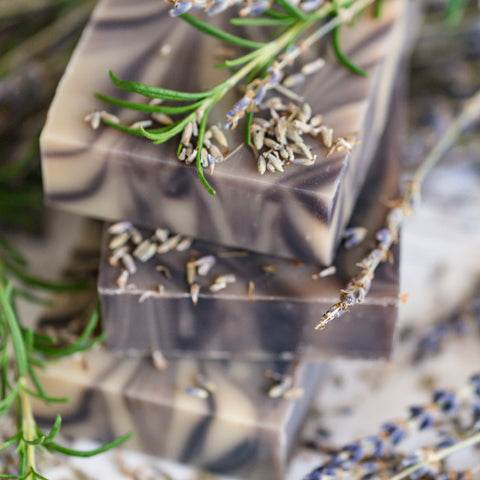
Our scented natural soaps are made with pure essential oils, not fragrance oils, and offer aromatherapeutic benefits.
Fragrance oils, whether artificially created or derived from natural components, may duplicate the smell of a flower or herb, but they do not offer the therapeutic advantages of essential oils.
Furthermore, the generic term, “fragrance” or “parfum” on a label can indicate the presence of up to 3,000 separate ingredients and the FDA does not require companies to disclose what is in a “fragrance,” because it is considered a “trade secret.”
BLOG: Why We Use Only Real Plant Essential Oils
The body’s largest organ, our skin, is incredibly porous and absorbent. How we treat our skin can have a major impact on our overall health as well as the look and feel of our skin.
Everyone wants healthy skin and our skin is not a fan of synthetic chemicals. I cannot count how many times customers have told us that our natural soap has not only helped improve their skin but has improved their lives by relieving itchiness and dryness, and easing irritated skin conditions such as eczema and acne.
People absolutely love bubbly lather. The foam, bubbles, and lather we know and love from commercial liquid and bar soaps are produced by surfactants--synthetic foam boosters, lathering agents, and detergents.
A properly formulated and cured bar of natural soap needs no synthetic additives to create a lather or to clean because natural soap is a natural surfactant. So it not only makes great bubbles and lather, but it also helps clean oily dirt from your skin--naturally!
BLOG: "How Does Natural Soap Create Lather?"
Some consumers are put off by the cost of handmade soap. You probably look at a bar of natural soap and wonder why it costs more. I mean, soap is soap, right? Both bars clean your skin, right?
While I may agree that both bars clean the skin, the similarity goes no further. Simply put, commercial soaps contain synthetic ingredients that are very cheap to produce in a lab.
If you use a liquid body wash the main ingredient is water. You pay for water. A properly cured soap bar has very little water remaining, meaning you are getting exactly what you pay for.
I believe that old saying, "You get what you pay for," rings true when comparing a handmade bar of a natural soap to a commercial brand!
BLOG: "The True Cost of Commercial Soap"
It may seem odd that a product we use to keep our bodies clean is doing quite the opposite for our environment.
If you are not using a natural soap, as you take a bath or shower you coat your skin with synthetic compounds like fragrances, dyes, preservatives, and detergents. These synthetic ingredients wash down our drains into our septic fields or water treatment facilities. Now imagine the millions of people who use these soaps each day.
Also, if you use a liquid body wash, how many plastic bottles and pumps do you dispose of in a single year?

I make handmade natural soap. I did not invent anything new.
But what I know is that our natural soap is made in small batches by people who have a passion as well as a mission for making natural products.
For me, soapmaking is a synergy of science and art that took years to perfect. It is a labor of love. I take the time to create wholesome soap recipes that do not sacrifice beauty or scent while incorporating amazing natural and organic ingredients.
While I am sure there are some large commercial soap companies with a social conscience, natural soapmakers tend to have the utmost respect for the earth and all its creatures.
Environmental stewardship is not a buzzword for us. It is not a talking point, not a political stance nor is it about optics!
At Chagrin Valley it is our practice to use raw materials that are sourced in an environmentally and ethically responsible manner.
Dedication to a kinder and gentler way of living is a big part of why we do what we do.
 If you are holding this soap in your hand, I probably don't need to convince you that shopping small business is important. Your purchase really does make a difference.
If you are holding this soap in your hand, I probably don't need to convince you that shopping small business is important. Your purchase really does make a difference.
When you buy a handmade bar of natural soap, you are supporting a small business that truly cares about and believes in the products they make.
Small businesses are run by people - not by boards or stockholders. They are often entrepreneurs who bring a creative freshness into an otherwise regimented world.
We do it all ourselves--from start to finish--from our hands to your hands--from our family to yours! Thank you!
Before I conclude I would like to add one final reason to the question of "Why You Should Switch To Natural Soap Bars."
From its composition to its benefits for the skin and health, to its impact on the environment, natural soap is very different from commercial liquid “soap,” bar “soap,” or syndet bars.
If you think about it, your skin type is not even the same for all of the areas of your body.
The skin on your face is different from the skin on your hands, which is different from the skin on your back which is different from the skin on your feet ...etc.
Although your skin type is determined by genetics, it will also be affected by other factors and can change with time.
Understanding your skin type is a good starting point before trying or switching to natural products.
There are typically five types of healthy skin: normal, dry, oily, combination, and sensitive.
NORMAL SKIN
This skin is balanced, neither too dry nor too oily. It has regular texture, no imperfections and a clean, soft appearance, and does not need special care.
OILY SKIN
Oily skin is the result of excessive secretions of sebum, an oily secretion of the sebaceous glands. Oily skin tends to attract more dirt and dust than dry skin and may be prone to blackheads, acne, and excessive shine. It is frequent in adolescents and often seen with acne or blemish-prone skin.
DRY SKIN
For some people dry skin is caused by external factors such as the weather, low air humidity, sun, or hot showers, and it is often temporary.
However, for others it may be a lifelong condition. Dry skin is a result of a decrease in natural oil production which often results in skin that is flaky and has a rough appearance. Dry, cracked skin is often prone to skin disorders, such as eczema.
 SENSITIVE SKIN
SENSITIVE SKIN
Truly sensitive skin easily reacts to external stimuli. The skin is often fragile, thin or fine-textured, dry, and prone to allergic reactions.
Sensitive skin often feels uncomfortable, tight, red or itchy. It is a delicate skin that needs a lot of TLC.
COMBINATION SKIN
Combination skin is just what is sounds like, it has characteristics of both dry and oily skin. The area with more oil is usually the T- zone (forehead, nose, and chin), while the skin on the cheeks is normal or dry.
For more information on skin type and help with product recommendations for your individual needs, please read our blog, What's Your Skin Type?

Regular handwashing is one of the best ways to remove germs, avoid getting sick, and prevent the spread of germs to others.
The CDC (Centers for Disease Control and Prevention) says that for good hand hygiene all you need is plain soap and water.
Clean hands can stop germs from spreading from one person to another and throughout an entire community.
Five simple and effective steps can help reduce the spread of illness so you, your family, your friends and the general public can stay healthy.
CDC recommends cleaning hands in a specific way to avoid getting sick and spreading germs to others. The guidance for effective hand washing was developed based on data from a number of studies.
1. Wet your hands with clean, warm running water and apply soap.
2. Lather your hands by rubbing them together with the soap.
3. Scrub your hands for at least 20 seconds.
4. Rinse your hands well under clean, running water.
5. Dry your hands using a clean towel or air dry them.
To date, studies have shown that there is no added health benefit for consumers (this does not include professionals in the healthcare setting) using soaps containing antibacterial ingredients compared with using plain soap.
Information is taken from the CDC.gov website
Read our blog "Simple Soap Can Help Decrease the Spread Of Viruses"
We often receive emails from concerned customers that have read about the devastating effects that palm plantations can have on tropical forests.
At Chagrin Valley Soap we treasure our planet and its inhabitants. We know that although we play a very small part, we must always make choices that are ecologically and socially responsible.
As the global demand for palm oil continues to increase we want to be part of the global initiative that changes how that palm oil is grown.
Our Palm Oil is grown and manufactured according to standards for sustainable practices set forth by Palm Done Right.
Certified sustainable by RSPO (The Roundtable on Sustainable Palm Oil) and Palm Done Right

Our USDA organic palm oil variety carries RSPO Certification, otherwise known as Roundtable on Sustainable Palm Oil, guaranteeing the sustainability and traceability of the palm oil production throughout the supply chain.
It has RSPO-IP (Identity Preserved) certification which is one of four certification levels offered by the RSPO and carries the highest and strongest level of sustainable guarantee with traceability of each lot of palm oil back to the field of origin. With Identify Preserved sustainable palm oil, the entire batch of palm oil is from a single identifiable certified source and kept separate from all non-certified batches.

Palm Done Right presents the first fully integrated, 100 percent organic supply chain in the palm oil industry. Palm Done Right requires a fair labor certification, organic certification, Non-GMO Project Verification, and has the highest level of certification — Identity Preserved — offered by the Roundtable for Sustainable Palm Oil (RSPO).
As the global demand for palm oil continues to increase, we believe that if both manufacturers and consumers demand Certified Sustainable palm oil, producers will grow Certified Sustainable palm oil. That is the only way to really protect our rainforests.
If there is no demand for sustainable palm oil, growers will continue their cheaper unsustainable practices, because no one is paying them for a sustainable product. (If you build it, they will come!)
Please read our blog, "Will A Palm Oil Boycott Really Help?"
NO! Adding antibacterial chemicals to soap does not keep your family safe from germs.
I understand why folks (especially those with children) are choosing products labeled “Antibacterial,” hoping to keep their family safe in the war against germs.
According to Janet Woodcock, M.D., director of the FDA’s Center for Drug Evaluation and Research (CDER).
"Consumers may think antibacterial washes are more effective at preventing the spread of germs, but we have no scientific evidence that they are any better than plain soap and water.
In fact, some data suggests that antibacterial ingredients may do more harm than good over the long-term.”
Simply washing your hands with old-fashioned natural soap and water rids your skin of most fungi, bacteria, and viruses. Soap does not kill germs, it surrounds them and carries them away.
Please read our blog: Antibacterials: More Harm Than Good!
Yes And No!
Although handmade natural soaps usually get better with age, we recommend using our soaps within 12 months of purchase. Our scented soaps should be used within 3 months after removing them from the box.
Although the soaps will not be "spoiled" after that time, you may notice some changes as natural soap ages.
The changes in color and scent happen even more quickly in our sample size bars.
These small natural soap bars have a much greater surface area to volume ratio which allows essential oils to evaporate from the surface more quickly. However, the scent may still be there when you lather up.
I have found some ancient bars hiding in my closet that years old. The scents were gone, but the lather was incredible!
For a more detailed discussion please read our blog, "The Shelf Life, Color & Scent of an All Natural Soap."
Chagrin Valley Soap & Salve has been Leaping Bunny Certified since 2013.
 The Leaping Bunny Program was developed in 1996, by The Coalition for Consumer Information on Cosmetics (CCIC), to identify and support companies that are doing their part to help eliminate the unnecessary use and mistreatment of animals to test cosmetic products and ingredients. The CCIC is made up of eight animal protection groups including the Humane Society of the U.S., as well as groups from Canada and Europe.
The Leaping Bunny Program was developed in 1996, by The Coalition for Consumer Information on Cosmetics (CCIC), to identify and support companies that are doing their part to help eliminate the unnecessary use and mistreatment of animals to test cosmetic products and ingredients. The CCIC is made up of eight animal protection groups including the Humane Society of the U.S., as well as groups from Canada and Europe.
At Chagrin Valley we do not test our finished products on animals (other than human volunteers). But what about the raw materials, the ingredients we use?
Many products display labels claiming that their finished product is ‘not tested on animals’ but this does not guarantee that the product ingredients are actually free from animal testing.
The CCIC Standard is a pledge that a company makes to remove animal testing from all stages of product development. Our pledge to buy ingredients that are cruelty-free is integrated into the purchase agreement for all of our suppliers.
Personal care products displaying the “real” Leaping Bunny logo are certified ‘cruelty-free' using the internationally recognized Humane Cosmetics Standards. These rigorous standards require that no animal testing is performed or authorized for finished products or any of the ingredients in any stage of product development by the company, its laboratories or its suppliers after a fixed cut-off date. All Leaping Bunny companies are subject to independent audits and pledge commitments that are renewed on an annual basis.
This annual renewal is a key requirement that sets the Leaping Bunny Program apart from other cruelty-free certification programs. Companies that manufacture products, as well as their ingredient suppliers, must annually recommit to upholding their promise to not conduct animal testing on any finished products, ingredients, or formulations.
Why is this annual commitment renewal important? "Because product formulations change, suppliers come and go, and manufacturers develop innovative lines to meet consumer needs. But we know that compassionate consumers need to be confident that no animal testing is involved in the products they use."
At Chagrin Valley Soap & Salve . . .
The Leaping Bunny Program provides
the best assurance to consumers
that they are making compassionate shopping choices
by purchasing Cruelty-Free skin care!








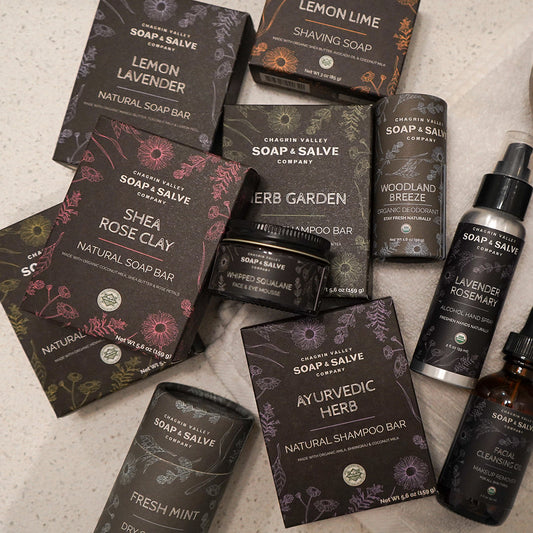
Discover why truly natural and organic skincare matters—for your skin, your health, and the planet. Learn how our USDA-certified products prioritize clean ingredients, sustainability, and transparency and what sets Chagrin Valley apart in a world of misleading beauty industry claims.
Read Post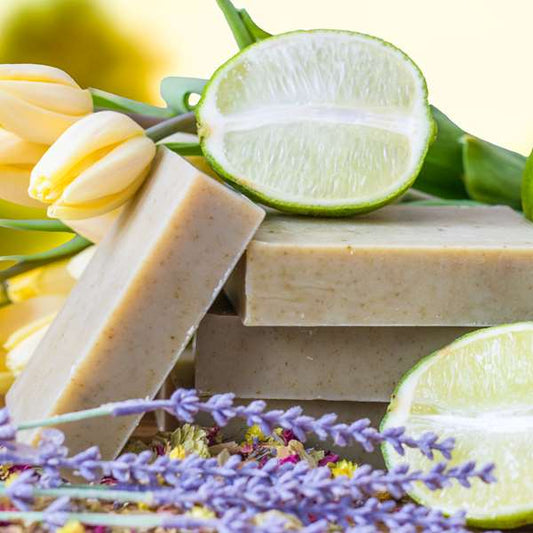
Help Me Choose a Natural Soap: Your skin type is unique to you! We have compiled natural soap recommendations based on information gathered from friends, family, and customers. We hope this will help you make your choices based on skin care needs and sensitivities.
Read Post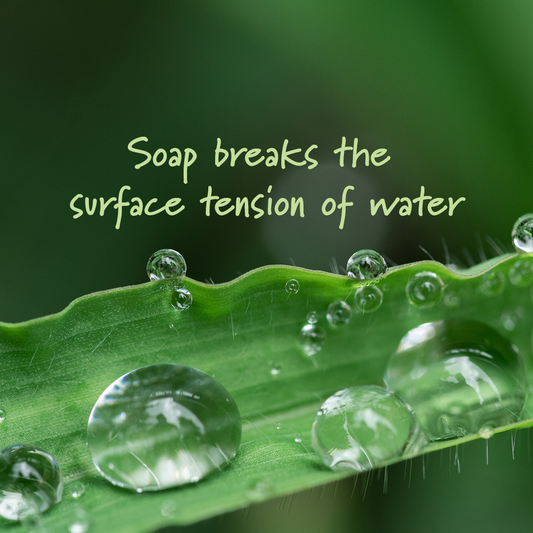
Soap cleans because it can mix with both water and with oil. When greasy dirt is mixed with soapy water, the oil tucked into the center of a tiny micelle cluster and then both are rinsed away.
Read Post